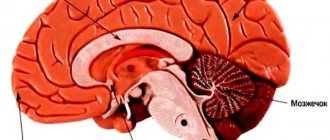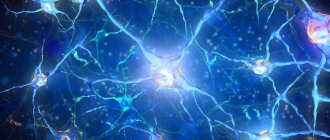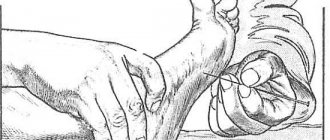Patients with portal hypertension are characterized by neuropsychic disorders of an episodic nature: paracosismal states with polymorphic disorders, sometimes with changes in consciousness and autonomic disorders, periodic tremor of the hands, episodes of daytime sleepiness, attacks of cephalalgia, cramps. These disorders are more common in patients with surgically performed vascular anastomosis and chronic encephalopathy. Gubsky (1970) points out that intellectual-mnestic disturbances can have diagnostic value in the study of chronic HPE. The AUTHOR conducted an experimental psychological examination of patients using methods for studying memory, thinking, and the rate of motor reactions. An experimental psychological examination of patients showed that they are characterized by a decrease in memory, expressed in disruption of the learning process and a drop in the productivity of long-term retention of material. When studying thinking, changes in its operational side were revealed, which was expressed in a decrease in the level of generalizations, and in some cases in their distortion (Zeigarnik, 1962). Intellectual-mnestic disorders were found mainly in patients with the intrahepatic form of portal hypertension. Kardell et al. (1970) used a battery of psychological tests to assess the degree of cognitive decline in 34 patients with portal hypertension after surgical portacaval anastomosis. Unfortunately, the authors did not conduct a structural analysis of the identified disorders, but limited themselves to a general assessment of the success of the tests used, noting only that in chronic HPE, unlike alcoholic encephalopathy, there is no selective memory loss. This feature of the psychoorganic syndrome in GPE was noted even earlier by Vicfor (Vicfor et al., 1965), who used a set of Wechsler psychological tests. The results obtained by various authors indicate disturbances in the dynamics of mental processes, which were revealed in fluctuations in attention, exhaustion of patients, decreased ability to concentrate, instability of performance, inertia of thought processes, and disturbances in the productivity of the associative process. Along with changes in dynamics, specificity of thinking, difficulties in making complex generalizations, and the tendency of patients to detail are described. Such violations of cognitive activity are qualified in the pathopsychological literature as violations of the operational component of thinking (Zeigarnik, 1962, 1976). The degree of severity of disturbances in mental activity depends on the severity of the condition, duration and intensity of intoxication and is an objective characteristic of somatogenic encephalopathy (Tsivilno, 1970, 1977; Tsivilno, Gudkova, 1972; Kareva et al. 1979). As we see, the psychological aspects of the problem are poorly developed. At the same time, the clinic of chronic somatic diseases poses a number of questions to psychologists. One of them: how does the disease and treatment affect the patient’s personality? Most often, patients become aware of their illness and become irritable and depressed. Here the help of a psychiatrist and psychologist is needed, their choice of an adequate psychotherapeutic effect on the patient. The use of hemodialysis has made it possible to prolong the lives of those who previously died from uremia and to prepare for kidney transplantation. But the use of hemodialysis also posed a number of problems: the patient must decide to be treated with hemodialysis, and this leads to the problem of dependence on the artificial kidney machine, fear of the first hemodialysis, waiting for the installation of an arteriovenous shunt, etc. The “artificial kidney” device is far from perfect; useful substances (potassium, vitamins, etc.) are also removed from the body along with toxins. In this regard, issues of the influence of hemodialysis on the mental and somatic state of the patient must be resolved. Another question is the question of the attitude of patients to their illness, to the fact of receiving disability. It has been established that among patients, as a rule, there are two groups: patients who have completely “sunk” into the disease, and those who want to continue working and not be cut off from life. Psychologists also face the difficult problem of social and labor readaptation and rehabilitation of patients. And the solution to this issue is impossible without studying the cognitive sphere of patients.
CRF – previous page|next page – memory impairment
The impact of chronic illness on the psyche. Content.
Three stages of cognitive impairment
Such violations are usually classified according to the severity of the consequences. Cognitive disorders may be of the following nature:
- With mild disorders, minor changes are observed that fall within the established norms for a specific age group. Such disorders do not create problems for a person in everyday life. At the same time, people themselves or those around them may notice such changes.
- Moderate impairments are characterized by changes in cognitive functions that go beyond existing norms. However, such violations do not affect the person’s condition and do not cause maladjustment in his everyday life. Moderate disorders usually manifest themselves as problems in performing complex intellectual tasks.
- The most dangerous type of cognitive personality disorder is dementia, or dementia. This condition is accompanied by significant changes in memory and other brain functions. Such disorders are pronounced and have a direct impact on a person’s daily life.
How to improve the patient's condition?
When selecting a treatment regimen for a patient, it is important to first establish the cause of the development of cognitive disorder. Therefore, after assessing the mental status, a comprehensive examination of the patient is carried out.
Treatment tactics for disorders are determined based on the severity of the disease and the cause of the brain dysfunction. In the treatment of mild to moderate dementia caused by Alzheimer's disease or vascular pathologies, acetylcholinesterase inhibitors or Memantine are used. However, the effectiveness of these drugs has not yet been proven. They are prescribed mainly to prevent further progression of the pathological process and the development of dementia.
In case of diagnosing vascular pathologies that provoke a failure of brain activity, the following are used:
- phosphodiesterase inhibitors promote vasodilation, which leads to normalization of blood circulation;
- α2-adrenergic receptor blockers suppress the actions of the sympathetic nervous system, which lead to the narrowing of blood vessels.
Actovegin is used to restore neurometabolic processes. The drug increases the plasticity of brain neurons, which has a positive effect on cognitive functions.
In addition to these medications, in the presence of neurological disorders, various therapeutic tactics are used to correct the patient’s behavior. It takes a lot of time to complete this task, since such treatment involves a consistent transformation of the human psyche.
Classification
Intellectual disabilities in childhood are divided into quantitative and qualitative. The first group includes:
- Impaired mental function. Slow maturation of the morphofunctional systems of the brain occurs under the influence of unfavorable factors and is expressed by the immaturity of psychomotor and cognitive functions.
- Mental retardation. It is a mental retardation - a persistent congenital or early acquired impairment of intelligence. There are three degrees: mild (moronicity), moderate (imbecility), severe (idiocy).
- Dementia. Acquired persistent or progressive dementia, developing as a result of the loss of formed intellectual functions.
Qualitative intellectual impairments in children are caused by uneven development of mental, psychophysiological, emotional and volitional functions. We are talking about a disorder in cases where the uniqueness of the intellect prevents the child from adapting to the environment at the level of everyday self-care, social interactions, and mastering educational skills. Qualitative changes are found in schizophrenia, early childhood autism, diseases of the sensory organs, and speech pathologies.
Complex of provoking factors
There are more than 10 different factors that can lead to cognitive disorders of brain function. The most common cause of such disorders is Alzheimer's disease. This pathology is accompanied by the gradual death of brain neurons, as a result of which its individual functions are suppressed.
The first and most striking sign of Alzheimer's disease is memory loss. At the same time, motor activity and other cognitive functions remain within normal limits for a long time.
Quite often, cognitive disorders can manifest themselves in vascular diseases of the brain. These include:
- heart attack;
- chronic cerebral ischemia;
- ischemic stroke;
- atherosclerosis;
- hemorrhagic brain damage.
Basically, dementia and other forms of psychoneurological disorders are caused by a combination of vascular pathology and circulatory failure in the brain. The risk group for developing such complications includes people who have been diagnosed with:
- atherosclerosis;
- hypertension;
- arterial hypertension.
Among the probable causes of the development of psychoneurological disorders are severe poisoning and long-term use of psychotropic substances. Head injuries can also lead to dementia and mild impairment of brain function.
Treatment of intellectual disabilities in children
Treatment of intellectual disabilities is aimed at eliminating reversible causes, providing support and symptomatic therapy for persistent congenital pathology. The following types of medical, psychological and pedagogical assistance are indicated:
- Drug treatment. Drugs are selected taking into account the etiology of intellectual impairment. For organic brain damage, cerebral circulation correctors, nootropics, and psychostimulants are prescribed; for diseases of the endocrine system - hormonal agents; for psychotic disorders - antipsychotics; for emotional and behavioral abnormalities - sedatives, tranquilizers.
- Psychocorrection. Classes are conducted by psychologists, oligophrenopedagogues, and defectologists. The goal is determined by the depth of the intellectual impairment and the child’s learning ability. Mild forms can be corrected by more careful elaboration of lagging functions. In case of persistent deviations or decreased learning ability, special programs are used aimed at developing practical, everyday skills that promote adaptation.
- Rehabilitation. With mild impairments, children are involved in educational, sports, and creative activities in schools and additional education institutions. Persistent deviations require referral to special schools. To prevent social and labor disadaptation, individual rehabilitation programs are being developed.
Diagnostic criteria
Diagnosis of malfunctions in brain functions is carried out if the patient or his immediate relatives consult a doctor with complaints of memory loss and deterioration of mental abilities.
A study of a person's current state is carried out using a brief mental status assessment scale. In this case, it is important during diagnosis to exclude the presence of emotional disorders (depression), which lead to temporary memory impairment. In addition to screening scales, the patient’s mental status is assessed through dynamic monitoring of him and his behavior. Repeated examination is scheduled approximately 3-6 months after the first one.
To assess the degree of dementia, the patient is asked to draw a clock
To quickly analyze the patient’s mental state, the so-called Montreal Cognitive Impairment Rating Scale is used today. It allows you to test many brain functions in about 10 minutes: memory, speech, thinking, counting ability and more.
The assessment is carried out by testing the patient. He is given tasks and a certain time to complete them. At the end of the tests, the doctor calculates the final results. A healthy person must score more than 26 points.
The MMSE scale is used in stroke to detect cognitive impairment
Pathogenesis
The pathogenetic basis of intellectual disorders in children is encephalopathic and cerebrasthenic changes in the central nervous system, psychosocial conditions of development. Functional, organic abnormalities of brain function according to their etiology can be hypoxic, traumatic, toxic-metabolic, infectious.
They are manifested by excitation or inhibition of central nervous system activity, symptoms of intracranial hypertension, convulsive syndrome, dysfunction of the brainstem, insufficiency of cortical-subcortical interactions, and local damage to certain areas of the cortex. The severity of an intellectual defect, its totality or partiality, and the possibility of compensation are determined by the psychological characteristics of the child and social conditions.











